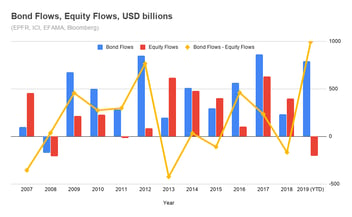The stock market moves in cycles, and that means that, eventually, periods of high returns will be followed by periods of not-so-favorable performance. When investors get spooked, whether it’s due to something in the news or a recent economic report, volatility occurs. As a result, your portfolio may experience some short-term losses—though historically, the market has always recovered.
One of the major benefits of working with a financial advisor is the ongoing support you receive during both the good times and the bad. But is your advisor doing everything they should be to help you through difficult market conditions? Or does market volatility have you feeling isolated and questioning your next move?
Here are five things you should be getting from your advisor during periods of volatility.
#1: Proactive Communication
You shouldn’t have to seek out support from your advisor anytime the markets move in a major way. Advisors understand that money is incredibly personal, and it can be difficult for investors to watch their portfolio balance drop overnight.
Before any major market event, your advisor should explain how volatility will likely affect your portfolio—especially since different types of assets (stocks, bonds, cash equivalents, etc.) and sectors (tech, healthcare, government, etc.) are impacted in different ways. For example, a short-term market “crash” may cause your stocks to sink in value temporarily, but your bonds or cash equivalents may remain unaffected. This is why it’s important to diversify your holdings and understand how volatility impacts the different components.
Many advisors will send out regular updates on market conditions, typically once a month or once a quarter. In between these market updates, they should be easily accessible and available for you to talk through your questions and concerns.
#2: Emotional Support and Education
As we mentioned before, a sudden market decline is scary for most investors. If your advisor isn’t there talking you through it, you may be more tempted to make emotionally driven or impulsive decisions—such as moving all your money out of the markets. This may very well be a short-sighted decision that could result in long-term ramifications, like not being able to meet your greater goals (retirement, paying for college, buying a second home, etc.).
Advisors should help their clients maintain a long-term perspective on their portfolio in order to prevent panic-driven decision-making.
Here’s why it’s critical to maintain perspective:
According to a study by J.P. Morgan, if an investor missed just 10 of the single best days in the stock market over the past two decades, their returns could be cut nearly in half. But here’s the kicker, 70% of those best days happened within just 15 days of the 10 worst days.1
Anytime you’re feeling fearful or anxious about staying invested during a period of volatility, your advisor should be able to provide some historical context and insights into the importance of staying invested for the long haul.
#3: Portfolio Review and Rebalancing
Just because you shouldn’t pull out of the markets completely doesn’t mean your portfolio shouldn’t be evaluated during periods of volatility. Your advisor can assess your current asset allocation to determine if adjustments are necessary given the market changes.
They may also be able to find new opportunities within the market downturn—often, savvy investors can find “bargains” on investments by buying them during periods of volatility.
A downturn may also cause your portfolio to shift away from its target allocations (ex. 60% stocks, 40% bonds). Your advisor should be rebalancing (if necessary) to maintain the portfolio’s intended balance.
#4: Risk Management Strategies
If you worked with an advisor to develop your portfolio, it was likely created with your unique risk tolerance in mind. However, it’s possible that once that risk tolerance is “put to the test,” so to speak, during periods of market volatility, it may need some adjusting. Your advisor can review and adjust your risk tolerance if necessary, as well as discuss ways to further diversify your portfolio—if you feel overexposed to market movements.
#5: Tax-Loss Harvesting and Other Opportunities
Your advisor should be finding opportunities to help you take advantage of a market downturn.
If you and your advisor sell investments at a loss, for example, you may be able to use a tax-loss harvesting strategy to mitigate (or even cancel out) the tax liability of other investment gains. If you and your advisor believe you’ll earn less taxable income during the year than usual, you could also discuss ways to leverage the lower income year to your advantage. Perhaps this is a good time to pursue a Roth conversion, for example, since you’ll be in a lower tax bracket than normal.
Are You on Track to Achieve Your Financial Goals?
If you’re working with a financial advisor, you should never feel isolated or unsupported during periods of market volatility. In fact, that’s when your advisor should be communicating with you the most, helping you navigate uncertainty and taking advantage of the unique opportunities it presents.
To learn where you stand with your financial goals today, check out our free assessment.
Sources:
1The five most popular investing mistakes of 2024



